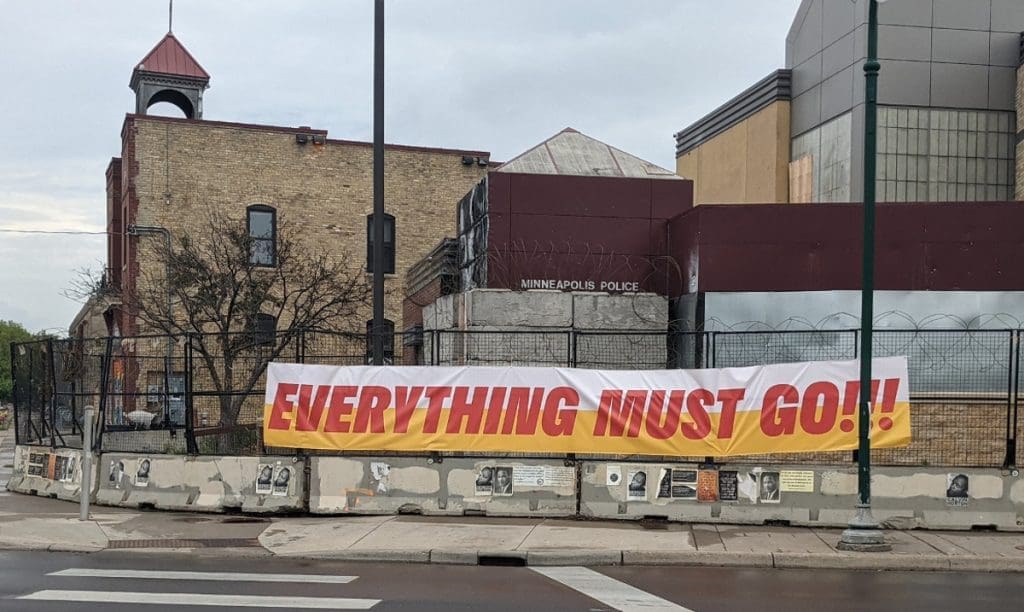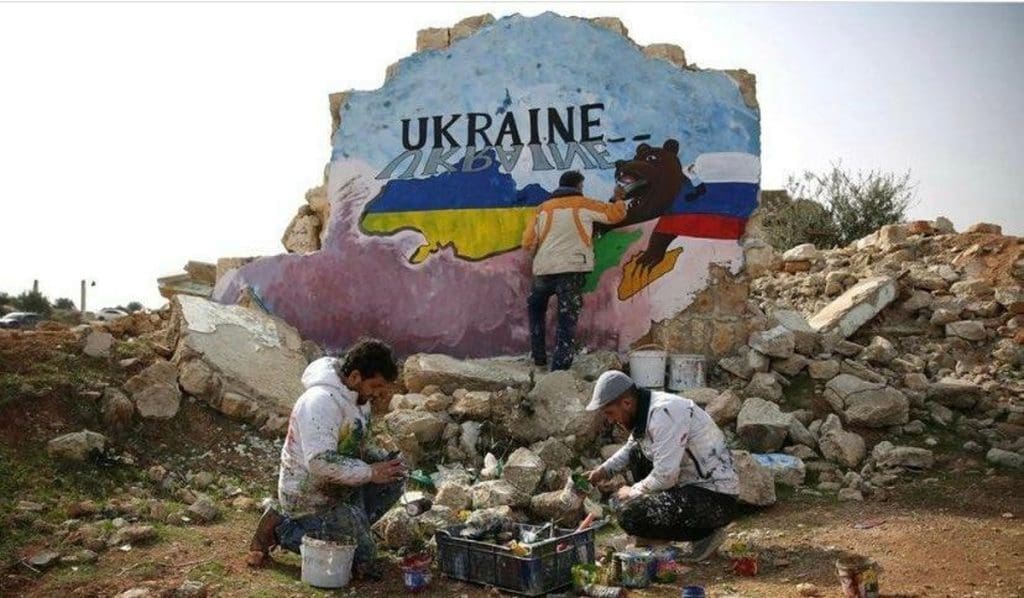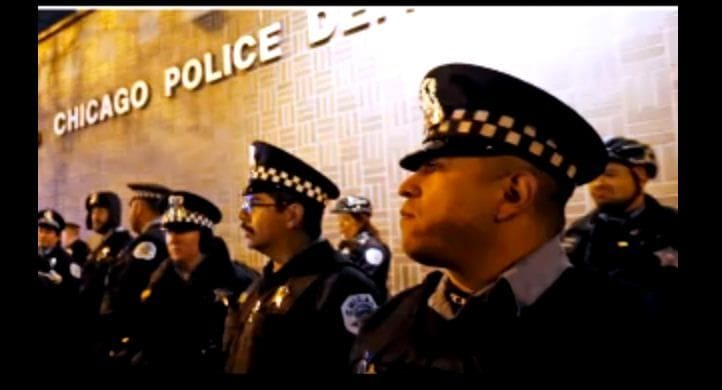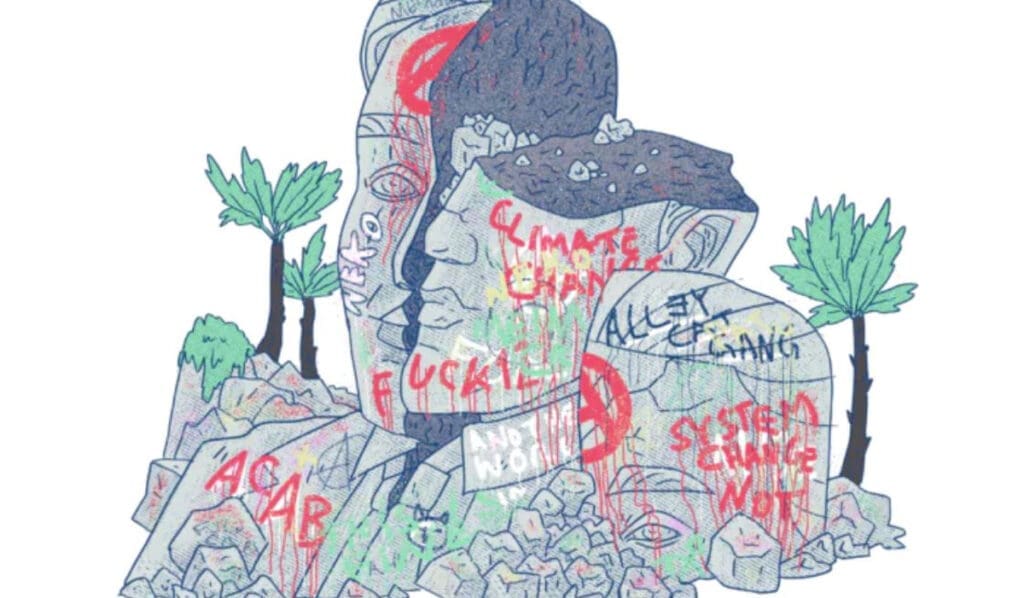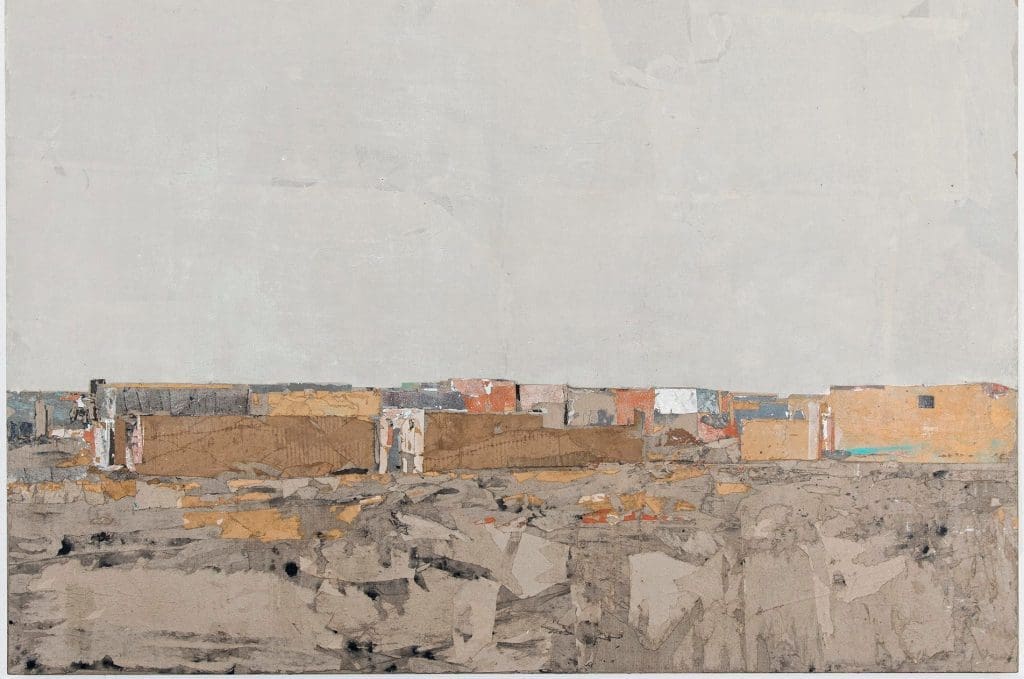Transcribed from the 6 May 2021 episode of This is Hell! Radio (Chicago) and printed with permission. Edited for space and readability. Listen to the whole interview:
Critique, serious thinking, and analysis is the antidote to propaganda.
Chuck Mertz: When we think of Minnesota, it’s hard not to imagine a state filled with people as white as the blankets of snow that cover the state for at least six months every year. But that whiteness was not attained simply because Minnesota reminds descendants of Scandinavians of their home country and so were naturally attracted to the state. No, the racial makeup of Minnesota is part of a long process of ethnic cleansing and genocide, and that history repeated itself in the murder of George Floyd.
Here to give us a better understanding of Minnesota’s violent, genocidal history that revealed itself again in the killing of George Floyd, returning to This is Hell!, Africana studies scholar Yannick Giovanni Marshall wrote the Al Jazeera op-ed piece “Totalitarianism at 38th and Chicago.” I really enjoyed our conversation last time on Yannick’s article last year about people being fed up with Black liberals.
Welcome back to This is Hell!, Yannick.
Yannick Giovanni Marshall: Thank you very much.
CM: You write, “Minnesota, like every other state, begins with a lie. ‘Explore Minnesota’ tourism ads present the state as a natural paradise, as if the US military-occupied land of Mni Sota Makoce is God-country, some blessing bestowed upon God’s own settler colony.”
In neighboring South Dakota, Sioux Falls’s KELO TV reported this week, “South Dakota governor Kristi Noem says nationally, schools need to stop teaching children to hate their country. Monday the governor turned to social media to announce she’s the first candidate in America to sign the ‘1776 pledge to save our schools.’ The pledge is on a website put together by a group that supports former president Trump’s education vision. Noem also teamed up with Ben Carson to send a statement to Fox News saying Trump’s 1776 commission ‘offered real promise’ and that they want to ‘return to a truthful, patriotic education that cultivates a love for our country.’ Noem is quoted saying she is doing this ‘to be proud of America and our beginnings and to make sure that they have the facts.’ Some historians say Trump’s 1776 report was one-sided and contains inaccuracies. President Biden signed an executive order dissolving the commission.”
Yannick, is it possible to be proud of the United States and have a realistic history-based understanding of the United States? Can we both be proud and honest about US history?
YM: Yes, if the pride that you’re speaking of is white pride. What a patriotic history is, outside of just being the banner of totalitarian education everywhere (because ‘patriotic’ already implies bias and prejudice, a disemboweling of history in order to shape facts and evidence to fit a narrative), is by definition non-history. It is just propaganda.
If one is interested in pride in a settler colony or pride in a white supremacist space or project, one can definitely be proud of a white supremacist project by consuming white supremacist propaganda. There is no limit to how much you can be proud of white supremacy. All you have to do is continuously imbibe from media, churches, families, schools, textbooks—all the work white supremacist history has given to the public. That in itself is both the definition of patriotic education and white pride.
CM: Why do you think it’s not called out as propaganda more often? Why do we fear using that word? It’s almost as if we’re back in 2015 and afraid of using the word fascist. Why do we have this fear of calling out this white supremacist history as propaganda?
YM: The moment you start speaking about propaganda, you lose the effective nature of propaganda. It’s almost like when you’re dreaming—you’re in this dreamworld, and when your mind starts thinking about how this is a dream, you almost immediately wake up.
Critique is the antidote to propaganda. Critique and serious thinking and analysis is the antidote to propaganda. If you continue to think of education as simply education, and not education for a purpose, not education that is aligned with certain state objectives or white supremacist settler objectives, then education can seem like a wholesome and objective view of the world.
But obviously you can’t have an objective view of anything if you begin organizing your study and your consumption of information to fit the lines of a pro-state love. Propaganda is what happens when education is state education and flattering of the colony. Propaganda is the definition of education under colonialism.
CM: So why is it so attractive to so many people? On Fox News they’re constantly putting on these documentaries. There’s one called The True Story of Socialism about how socialism started with Adolf Hitler. Why are people attracted to being taught propaganda rather than being taught actual history?
YM: Because history, truth, will spell the destruction of a state built on lies, a house of cards which is attractive for people who want to continuously brainwash and manipulate young minds into service of the settler-colonial project. This is important is so that you can make sure, for generations upon generations, to suppress any possible political dissent—whether that be material political dissent, people actually doing work to end the settler-colonial project, or just destroying affections towards the settler-colonial state.
You need to shape the generations’ minds through education but also through family, through churches and so on, so they can salute—so they can Heil the state. Otherwise there’s a bunch of critical people asking if it’s really okay that people are hanging from trees, if it’s really okay that people were burned alive, if it’s really okay that land continuously serves the accumulation of families that worked in the destruction of Indigenous and other peoples.
These are questions that should not arise if you want to have a population that will salute the project of continuing accumulation and continuing destruction and management of political dissidents and bodies and people who are considered marginal and not worth help and service.
The entire system, the entire scaffold is the problem. The instrument is the problem. It’s an instrument to maintain the power relations, to prevent the oppressed from any possible revolution or simple freedom. To snuff out the threat of Black freedom, the instrument was produced. To fix the rope, polish or sweep the scaffold, change the hoods—that would not do anything.
CM: I can see how that kind of training could undermine your ability to engage in dissent despite the fact that freedom of speech is ‘guaranteed’ – you can’t really exercise that freedom of speech if you haven’t been educated in a way where you can counter the popular narrative of the powerful.
You write, “Minnesota is a lie. The okie-dokie of the folksy folk, the state of black cherry ice cream, honey crisp apples, and blueberry muffins was host to the largest mass hanging in US history. Four thousand cold Minnesotans gathered the morning after Christmas, 1862, blowing into gloved hands to watch thirty-eight Dakota men be murdered. These thirty-eight were the ones selected by the great emancipator president Abraham Lincoln, during the civil war, who picked them after studying the transcripts of the often five-minute-long trials from the list of the 303 Dakotas sentenced to death.”
Minnesota is a lie. Is Minnesota unique among the United States? Or are all states’ official histories based on lies?
YM: All states are based on lies. Because the truth will collapse the state or at least affection towards the state for people who believe that people should not be molested, tortured, destroyed, and burned alive and so on. History will destroy the state, so all states that have somehow forgotten the subaltern voices, the voices of Indigenous peoples, or have these voices quarantined off in spaces where they are just tokenistic history—that is in itself evidence of the lie. Honestly, if there is a dominant history and the dominant history is the history that flatters the killers, then that history is the propaganda that serves the institution that kills.
Yes, all states are necessarily a lie. This is not unrelated to the idea of freedom of speech. As you were saying, freedom of speech requires a freedom of imagination and freedom of thought. But also there cannot really be any freedom of speech because freedom of speech is the ability to speak freely but this is only determined by what that speech threatens. If your speech does not threaten the state, then you can say whatever you want. That’s why certain governments that are always under threat of anti-colonial revolution would seem to be cracking down more on freedom of speech. Whereas the American project might often advertise itself as the center of freedom of speech, that might just be because freedom of speech will not do any damage to a state that has the lie so convincing that clear and present evidence of dispossession does nothing to sway the population away from their affection towards the settler-colonial state.
So freedom of speech really should be considered in terms of what is threatening to the state and what is not, not what you’re able to say and what you’re not able to say.
CM: You point out that the “so-called blue wall of silence should not be bemoaned, as ahistorical liberalism is wont to do, as a structural imperfection of contemporary policing, but instead be read as in this centuries-old tradition of the American white supremacist secret society.”
Can white supremacy be reformed out of policing? Can cultural sensitivity training and educating law enforcement officials on the dangers of white supremacy eradicate white supremacy from police forces?
YM: No, I don’t think so. I don’t think the reason why officers join a white supremacist organization is because they missed the training session that said not to join a white supremacist organization. I don’t think the reason that people have drugs planted on them or they stop people under the false pretenses of a broken taillight is because the manual doesn’t say not to do that. Policing, in its settler-colonial structure, attracts the type of people—very different from the advertisement that they want to make a change or do something good—who like force, who like authority, and who like maintaining the order as they see it. And this order happens to be a white supremacist order.
Policing in the Kenya colony, policing in apartheid South Africa, policing in Rhodesia (Zimbabwe) always attracted white supremacists and people who are apologetic, or at least convince themselves that white supremacy wasn’t the main issue, to join these forces of order. If it has happened everywhere in the world despite the training manuals that exist, I don’t know why a training session, a lovey-dovey let’s-help-people anti-bias session would do anything to shift the general tendency of settler-colonial policing since settler colonialism has existed.
CM: Can we just end the law enforcement processes that have their roots in slavery, thus ending racialized police violence, whether inside or outside prison walls? You talk about solitary confinement and how that is a legacy of slavery. Can we just find those kinds of things like solitary confinement and eliminate the lingering legacy of slavery and thus end racialized police violence?
YM: That’s like looking at the hangman’s noose and associating that particular form of rope or twine with the twine that has been used in the seventeenth century and so maybe we can switch the type of rope so that we can eliminate the problematic legacies associated with the violent past, and use a different type of rope to execute people.
That wouldn’t make sense. The entire system, the entire scaffold is the problem. The instrument is the problem. It’s been an instrument to maintain the power relations, an instrument to maintain the possibility of accumulation for the haves against the have-nots; it’s an instrument to maintain the oppressed and prevent them from any possible revolution or simple freedom. To snuff out the threat of Black freedom, the instrument was produced.
To find a way to be able to fix the rope, polish or sweep the scaffold, change the hoods—that would not do anything. It only does something if one is convinced and adamant that the problem of management in settler colonialism is not the racial violence that it necessitates but the uniforms, the aesthetics, the surface-level things of that instrument. That is not what the problem is. The problem is the need for settler colonialism to manage and disappear Indigenous power and voices and to disappear freedom for the people who have been exploited and to maintain a system that benefits the haves and the whites.
It is not simply the killing of Black people that is desired in the settler empire, but the broadcasting of their deaths around the world. White supremacist violence in this era wanted to advertise, to display swinging Black bodies.
CM: You show how racism has been institutionalized through the law. You write about the Dred Scott case: “Dred Scott was forcibly relocated to Minnesota from a plantation in Southampton county, Virginia. After being marched through several of the colony’s forts he was eventually taken to Fort Snelling in Minnesota by the enslaver Dr. John Emerson of Missouri, who was also a US army surgeon. At his captor’s death, Scott famously sued for his freedom on the basis that slavery was outlawed in the area. Winning and losing court battles, enslaved and then pronounced free, the case rose to the colony’s supreme court, which pronounced its judgment: ‘[The African] had for more than a century before been regarded as beings of an inferior order and altogether unfit to associate with the white race either in social or political relations; and so far inferior, that they had no rights which the white man was bound to respect; and that the negro might justly and lawfully be reduced to slavery for his benefit.’”
Before we continue with that supreme court judgment, which is insane—in their twisted logic, how was slavery beneficial to the slave? Do you know if that’s still believed in white supremacist circles? That slavery was white people doing African-Americans a solid?
YM: You hear it all the time. One famous social media influencer recently said that colonialism was good “on the whole,” and when people say that it’s often seen as ignorance or being dismissive, but we should assume that they are very much aware of the role of plantations in Congo, very much aware of the genocide in Namibia, and that they think this is good. They are not ignorant of these things; this information is publicly available and we shouldn’t give them the benefit of the doubt.
Bill O’Reilly once said that the enslaved people in the white house were treated good, that they were all having a fun time. Bill O’Reilly would likely have known what slavery is. The people who are waving confederate flag know the history of slavery and suppress it while at the same time saying that it was generally good; they suppress information about slavery by banning books and stopping Africana studies and critical race theory and whatever else they are banning now—these people are both banning information and also celebrating the most violent aspects of these systems. These people are very much aware and in support of the settler-colonial and enslavement work of this state. They think, because their ideas of Black people are a caricature of the good slave and the loyal servant, that it is good for Black people to continuously be in a position of subservience to whiteness, despite the torture, despite the killings.
This is their position. It is not ignorance. This is their position. The most important thing to know about these white supremacist conservatives is that they have continued the Jim Crow legacy; they have continued the sentiments of slavery. They haven’t fundamentally departed and said it is entirely wrong, and set out to make a new type of conservatism. They have continued the space of the lynching, and they have continued this position, and they will always continue this position. It’s not about ignorance, it’s about who they are and who they have always been.
CM: The US supreme court ruling continues: “[Dred Scott] was bought and sold and treated as an ordinary article of merchandise and traffic, whenever a profit could be made by it. This opinion was at that time fixed and universal in the civilized portion of the white race. It was regarded as an axiom in morals as well as in politics, which no one thought of disputing, or supposed to be open to dispute; and men in every grade and position of society daily and habitually acted upon it in their private pursuits, as well as in matters of public concern; without doubting for a moment the correctness of this opinion.”
Is this evidence, then, proof that white supremacy was generally understood, practiced, and accepted by society when this decision was written in May 1857? Would teaching Dred Scott in schools be unpatriotic because it reveals the acceptance of white supremacy?
YM: The trajectory that white supremacists in power want to continue on is one where the teaching of Dred Scott will not be unpatriotic, because the treating of Black people as property or as having roles of subservience to white interests and the project of the settler colony is a good thing. So teaching Dred Scott will be patriotic as long as the racist notion of blackness and Black people prevails. It is not that they want to suppress the history of the Black enslaved. What they would like is to teach the history of the Black enslaved as a positive history for America, to say that there were people happy in their enslavement, people happy at their colored fountains, people happy in their lives because they are fundamentally suited, biologically suited for that life.
This has been the argument of colonizers that said that the native African is happy to be subservient to the white planter, or that they are only interested in having maize when the white settler in prison should be having chicken and meat. It’s not so much that they are trying to suppress history as much as make sure that history and the silent racialized characters in the story are situated in a narrative of white power and of white supremacy. They want history to be at the service of white supremacy, not the erasure of history in general.
CM: You write, “In June 1920, the John Robinson Circus made a stop in Duluth, Minnesota for one day, taking with them African-American cooks and roustabouts. A white woman and man went to the circus, entering the main tent. The next morning the Duluth police were called by the father of the man, accusing six of the Black workers of holding the couple at gunpoint and raping the woman.”
You write of the alleged rape that took place at the circus and the subsequent arrest and jailing of the accused: “Ordered to put away their guns to protect the mob, the police attempted, it is claimed, to fight the crowd off with their hands. Seizing three of the accused, the mob performed a mock trial—not that in a white supremacist colony there can be any other kind—and beat and hanged Elias Clayton, Elmer Jackson, and Isaac McGhie from a light pole with a rope that the owner of a hardware store gave to them on the house. The murder was photographed and printed on postcards as souvenirs.”
Were lynchings not only seen as a source of pride for the community that did the lynching, but did it also lead to tourism? Because that is the point of postcards: to get outsiders to come to your community to spend some time and some money. Were lynchings seen as good business?
YM: You can find writings asking for postcards all the way in South Africa, saying that they heard that a problem of race was handled in Texas and they would like to have an image of that. These are the colonial administrators of South Africa asking for pictures of lynchings in Texas. It was an international thrill of the white settler empire. Just the mere fact that there were “lynching bee” days and people gathered from near and far, sometimes hanging out the backs of buses, to come see the lynchings shows it as one of the most central pastimes. Not only was the killing of Black people a tourist industry, but the spectacle itself was definitional of the town and something that people took pride in.
The destruction of Black people, the destruction of blackness in public was not simply the execution of the other, but the performance of white supremacy and white torturous violence advertised to as many people as possible. It is not simply the killing of Black people that is desired in the settler empire, but the broadcasting of their deaths around the world, or as far as possible. White supremacist violence, especially in this era, wanted to advertise, wanted to broadcast, wanted to display swinging Black bodies. It wasn’t ashamed of it. It was for it.
This conflict between the liberal administration of white supremacy and the settlers’ white supremacy very often led to settlers saying that they wanted to overthrow the government because it was coddling the Natives.
CM: You write, “White mob violence directed at the white supremacist state it deems not sufficiently violent against Black and Indigenous people is characteristic of settler activists.”
So were the people more racist than the state? And if so, why did the state not accurately reflect the racism of white people?
YM: What is too often lost in discussions about race and settler colonialism is that there are factions in the white supremacist society. Very often the settlers and farmers, such as those in the 1920s and 30s, wanted to do what they will with the Native’s body, the African’s body, the Black person’s body—but the administrative state wanted to have a type of regularity. They still wanted to whip Black people, but they wanted to have the image of a type of impartial, technical whipping rather than a willy-nilly whipping.
This conflict that was written on the Black person, this conflict between the liberal administration of white supremacy and the settlers’ white supremacy, very often led to settlers saying that they wanted to overthrow the government because it was coddling the Natives. They did this in Kenya to the point that Britain actually had to send warships as a show of force against the settlers. They are so interested in having totalitarian possession of Black people that the white supremacist order itself hasn’t gone far enough!
What the white supremacist state administrative order wanted was a type of impartial, technical enforcement of white supremacy, for a number of reasons. One, to have the idea of truth in law or ‘law and order’ and so on, to impart the disciplinary function of law to the population so that Black people would say “I can’t do this because it’s five to ten.” But different ways of destroying Black people were clashing; it is only when they can find peace among themselves, like with the Trump-supporting population getting into positions of power, that it actually melds into a proper white supremacist, settler-led state—we see the results of that both in apartheid South Africa and in America.
CM: If the society is more racist than the state, would activists’ focus on society be a better focus to end racialized police violence than focusing on the police and the state? Is the real problem not the police but who the police protect and why they protect them?
YM: Yes. We have to be a little nuanced, because a lot of people who are virulent white supremacists like the possibility of being covered by the impunity that the state offers. Remember Kyle Rittenhouse wanted to be a police officer. There is a back-and-forth between white supremacist settler violence and institutions of the state. A lot of police officers go and join white supremacist organizations after they are retired or sent out. These groups are not separate. There’s a pipeline between these two forces.
But yes, one of the problems with thinking about the abolition of police and prisons is in imagining that the police and prisons are the end-all and be-all of white supremacist power. No—before the prison was established, before the official uniformed constables were in existence, there was still totalitarian control over blackness. This is why the end road of abolition must be critique of the entire settler colony. White supremacist society will find any instrument to maintain white supremacist power. We shouldn’t really be thinking about the fly-by-night instruments that they invent but rather the entire culture behind settlerism. This means that abolition must go further than whatever innovative institutions that they establish for this present time.
CM: How much do we need the police for our own safety and security? Without police, many fear crime will run rampant. Fox News reports that in Portland, New York City, and Minneapolis, the uprisings against police have led to crime waves and far more violence than in the past. So are protests against police proving that in fact we need police, as Fox News and other rightwing outlets insist?
YM: Right now crime is indeed running rampant: there are about three million people who are kidnapped and held against their will by the state. Crime is running rampant: there is destruction in the ocean, destruction in the environment, violence in the schools, and so on. As we mentioned before, there were lynching bees: thousands upon thousands of people participating in lynching who were not caught, not dealt with, and let to live out their whole lives. Crime is running rampant. Crime is the existence of settler colonialism.
There is no US court that is legitimate, because all US courts are performances, people dressed up, on fancy wood, waving settler flags, doing the business of performing justice in a place that is itself evidence of crime. It should be in the crime locker room itself. The settler state itself is the evidence of the crime.
If we are to speak about crime running rampant, we have to presume that the continuous crime of the state, the continuous crime of imperialism, is always presented as innocent whereas petty crimes or petty fights against property—fights against capitalism through the use of counterfeit money, or the destruction of settler property on Indigenous land—are violations. Whereas the lynching bees, the environmental destruction, the mass kidnappings and killings with impunity by people dressed up in cop uniforms—these things are not crime.
It requires the invisibility of Black life and Black suffering and the elevation of property. This is the perversion—for lack of a better word—of white supremacist logic.
CM: You give a rich historical context of lynchings and genocide. How does that historical context, in your opinion, inform you—or how should it inform us—about the police murder of George Floyd?
YM: For me, one of the worst things to happen is people speaking about the trial and conviction of Chauvin as a “first step.” By saying that, they make invisible the first steps that have happened before. There are other police who have been convicted of crimes. In order to imagine it as a first step, one has to be on the treadmill. In another two years, when another cop is convicted (and convictions, again, are just a part of ridiculous state practice), we will say again that this is a first step.
The invisibilizing of Black history and anti-Black violence creates a continuous series of first steps, of changes which allow people to think of George Floyd as a momentous time in history. The uprisings definitely were. But lynching, enslavement, parole and probation, surveillance in schools—the totalitarian aspects of settler colonialism have not budged from the first moments of its first light. To mark any specific event as fundamentally different is by definition to render the entirety of the settler colonial practice which Black people have been speaking about for years upon years and centuries upon centuries as irrelevant.
The logic and viewpoint of settlerism, of nationalism, of patriotism requires the burying of the history of anti-Black violence. Once we remove ourselves from patriotism, from nationalist devotion to the white supremacist state, from saluting settler colonialism—only then can we have a proper accounting of the violence that exists and see settler colonialism in the light of day rather than thinking this or that is a “first step.” Settler colonialism is a continuum of white supremacist power and white supremacist violence, and it is clear as day as long as we’re willing to see it.
CM: Yannick, thank you so much for being on our show.
YM: Thank you very much.
Featured image: the latest of many banners with which activists have adorned the burned-out third precinct in Minneapolis in the year since MPD cop Derek Chauvin murdered George Floyd. Source: Twitter

